The Nursing Home Law Center is committed to providing the legal resources necessary to hold negligent facilities accountable.
Augusta Nursing Home Abuse Lawyer

Licensed in Georgia
Nursing home abuse is a serious issue affecting countless elderly residents in Augusta and across Georgia. Victims often suffer in silence, experiencing physical, emotional, and financial abuse that impacts their health and well-being. When signs of abuse or neglect arise, families need to take immediate action.
Consulting with an experienced Augusta nursing home abuse lawyer can help you understand your legal rights, hold responsible parties accountable, and ensure your loved one’s safety.
Why Hire Nursing Home Law Center
At Nursing Home Law Center, our mission is to fight for justice and secure fair compensation for victims of nursing home abuse. Our skilled legal team has a strong history of handling abuse cases with care, consistently achieving substantial settlements and verdicts.
We thoroughly investigate each case to ensure all forms of abuse, including medical costs, emotional suffering, and other damages, are fully accounted for. Leveraging our extensive knowledge of nursing home abuse claims, we work diligently to protect your rights.
Throughout the process, we offer compassionate and clear guidance, keeping you and your loved ones informed and supported at every stage.
Types of Cases Handled by Our Augusta Nursing Home Abuse Lawyers
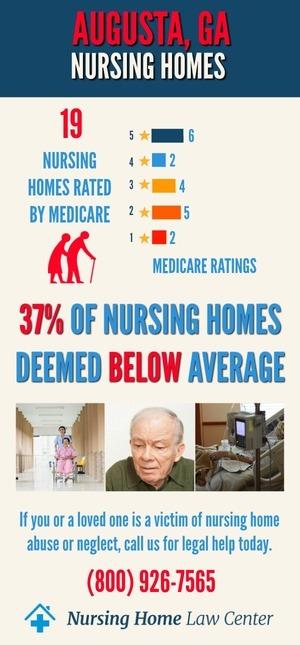
Nursing home abuse involves the mistreatment or neglect of elderly residents in care facilities, resulting in physical, emotional, or financial harm. Abuse can take many forms, and our Augusta nursing home abuse lawyers are experienced in handling a wide range of cases, ensuring victims receive the justice and compensation they deserve.
Physical Abuse
Physical abuse in nursing homes includes any form of violence or harm inflicted on a resident, such as hitting, slapping, or pushing. It can also involve improper use of restraints, leading to injuries or physical trauma. For example, a resident who is forcefully restrained may suffer significant physical injuries, bruises, or broken bones.
Psychological Abuse
Mental and emotional abuse can leave deep psychological scars on nursing home abuse victims. This type of abuse involves verbal threats, humiliation, or isolation, causing the victim severe distress and fear. For instance, a caregiver who constantly berates or isolates a resident could inflict lasting emotional harm.
Sexual Abuse
Sexual abuse in nursing homes is a horrific violation that includes any non-consensual sexual contact with a resident. Victims may be physically or mentally unable to give consent, making them especially vulnerable. Cases of sexual abuse may involve staff members or other residents exploiting this vulnerability.
Medical Malpractice
Medical malpractice occurs when a nursing home fails to provide adequate medical care, leading to harm. Common examples include untreated bedsores, medication errors, or failure to address worsening medical conditions. These errors can cause significant health deterioration or even life-threatening situations for residents.
Negligence
Nursing home negligence refers to the failure to provide proper care, resulting in harm. Neglect can include poor hygiene, malnutrition, dehydration, or incidents of elopement, where residents wander away unsupervised, often leading to preventable health problems, infections, or worsening medical conditions.
Financial Abuse
Financial abuse involves the exploitation of a resident’s finances by caregivers, staff, or others with access to their personal information. This may include stealing money, forging checks, or manipulating the resident to change wills or other financial documents to benefit the abuser.
Wrongful Death
In severe cases, nursing home abuse and neglect can lead to wrongful death. This tragic outcome may result from neglect, medical malpractice, or bodily harm. For instance, untreated infections, lack of proper supervision, or severe assault can cause fatal injuries or illnesses in elderly residents.
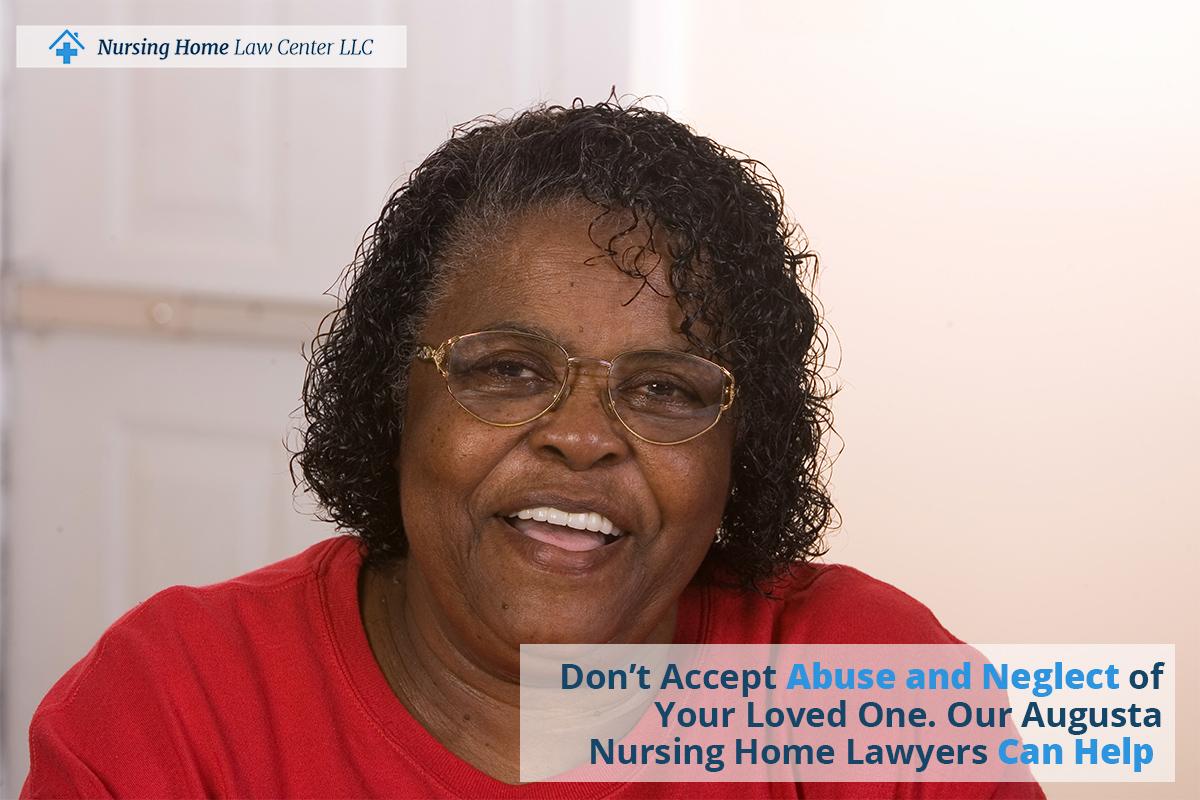
Understanding Your Legal Rights
Nursing home residents are protected by federal and state laws that ensure their right to receive proper care, live free from abuse, and maintain their dignity.
Under the Nursing Home Reform Act of 1987, nursing homes must provide care that promotes each resident’s physical, mental, and psychosocial well-being. This federal law establishes the rights of nursing home residents, such as the right to be free from physical restraints, abuse, and neglect and the right to participate in decisions about their care.
In Georgia, additional protections exist for nursing home residents through state regulations that mandate safe living environments and proper medical care in nursing facilities. The Georgia Department of Community Health oversees the enforcement of these regulations, ensuring that nursing homes meet required standards and that residents are safeguarded from harm.
Eligibility to File a Nursing Home Abuse Lawsuit
When nursing home abuse and neglect occurs, various parties can file a legal claim on behalf of the victim. These include the resident themselves, their family members, or a legal guardian.
In cases where the victim is unable to act due to incapacitation or death, close relatives or designated legal representatives can pursue claims to pursue justice and recover compensation for medical expenses, emotional trauma, and other damages.
Liability in Nursing Home Neglect and Abuse Cases
In nursing home neglect and abuse cases, multiple parties can be held accountable for the harm inflicted on residents. Determining who is responsible is crucial in pursuing compensation for the victim’s medical expenses, emotional trauma, and other damages.
- Nursing Home Facility: The facility can be liable if poor hiring practices, inadequate staff training, or a failure to maintain a safe environment leads to abuse or neglect.
- Caregivers and Staff: Individual staff members may be held directly responsible if they physically abuse, neglect, or exploit a resident. This liability extends to those involved in emotional abuse or neglecting essential care needs, such as hygiene and nutrition.
- Management and Administrators: Management can be liable if they fail to supervise employees properly, ignore complaints of abuse, or allow understaffing, which leads to neglect.
- Third-Party Contractors: In some cases, third-party service providers, such as medical staff or maintenance workers, may be responsible if their negligence or improper actions cause harm to residents.
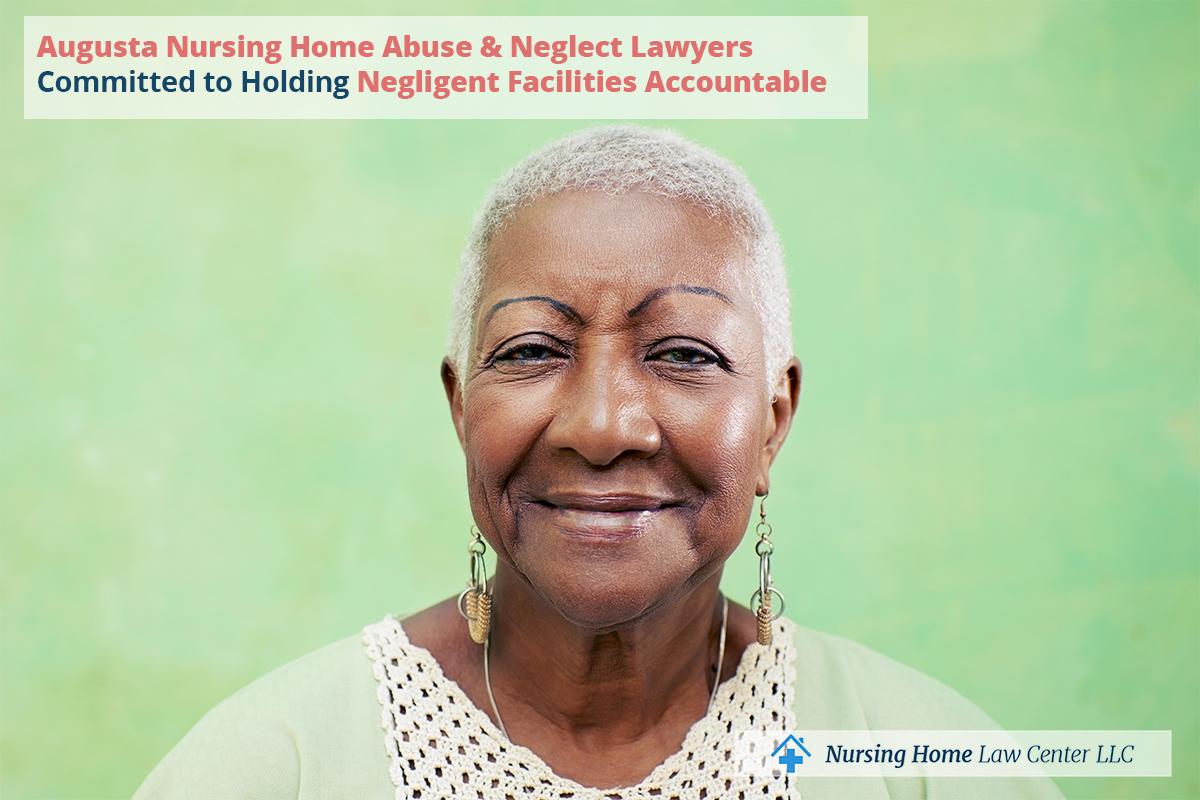
How Our Augusta Nursing Home Abuse Attorneys Can Help
At Nursing Home Law Center, our experienced Augusta nursing home abuse attorneys are dedicated to protecting the rights of residents and their families. With a deep understanding of elder abuse cases and nursing home negligence, we have successfully represented numerous clients, achieving favorable outcomes through settlements and trials.
Our compassionate legal counsel works diligently to hold responsible parties accountable and secure the compensation victims deserve. Here’s how we can assist you throughout the process:
Free Consultation
We offer a free case evaluation to review the details of your situation, assess potential claims, and advise on the best course of action. This initial consultation provides valuable insight into your legal options without any financial obligation.
Case Investigation
Our team conducts a thorough investigation into the circumstances surrounding the abuse or neglect. This step includes gathering medical records, interviewing witnesses, and reviewing the facility’s policies to build a strong case that addresses your loved one’s injuries and suffering.
Filing the Claim
Once we have a solid foundation for your case, we will file a nursing home abuse claim on your behalf. Our attorneys handle all the necessary paperwork and legal filings, ensuring the process moves forward without unnecessary delays.
Settlement Negotiation
Many nursing home abuse cases are resolved through settlement negotiations with the nursing home’s insurance company. Our experienced attorneys will negotiate aggressively to secure fair financial compensation for your loved one’s medical expenses, emotional trauma, and other damages.
Trial Representation
If a fair settlement cannot be reached, our legal team is fully prepared to take the case to trial. We have experienced trial attorneys who will fight for justice in court to hold the nursing home and responsible parties accountable for their actions.
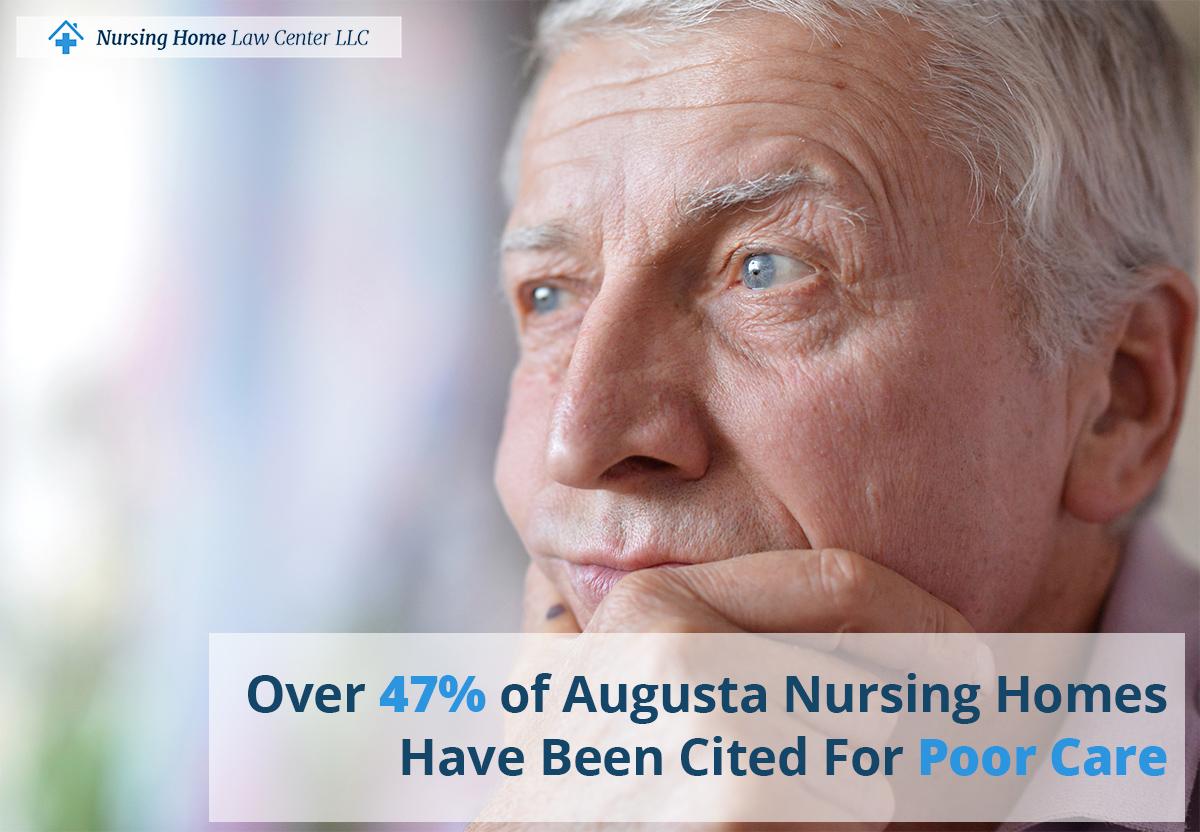
Common Signs of Elder Abuse Among Nursing Home Residents
In Augusta, Georgia, there are 21 Medicare-certified nursing facilities, with 10 facilities (48%) rated below or much below average overall. Specifically, eight homes (38%) fall short in health inspections, and 11 (52%) have inadequate staffing. Eight facilities (38%) are rated poorly in quality measures. [1]
The worst-rated nursing homes in Augusta include:
| Harborview Health Center of Augusta | Harrington Park Health and Rehabilitation |
| Pruitthealth- Aiken | Pruitthealth – Augusta |
| Pruitthealth – Evans, LLC | Pruitthealth – Richmond, LLC |
Abuse can manifest in various forms, and it’s important to be vigilant for any changes in their physical condition, emotional state, or behavior. Recognizing these signs of elder abuse in nursing homes is crucial to ensure your loved one’s well-being:
- Unexplained Physical Injuries: Bruises, cuts, burns, or broken bones may indicate physical abuse. Pay attention to unusual injuries or for which caregivers offer vague or inconsistent explanations.
- Sudden Changes in Behavior: Emotional abuse can cause noticeable shifts in a resident’s behavior, such as withdrawal, anxiety, depression, or sudden fearfulness, especially around certain staff members or other residents.
- Poor Personal Hygiene: Neglect often results in poor hygiene, with residents appearing unwashed, wearing soiled clothing, or having untreated bedsores, which can signal inadequate care or attention.
- Weight Loss or Dehydration: Malnutrition and dehydration can be signs of neglect. Sudden weight loss, constant thirst, or signs of dehydration, such as dry skin or confusion, may indicate a lack of proper nutrition and hydration.
- Fear of Caregivers: If a resident appears frightened or anxious around specific caregivers or staff members, it may suggest they are being physically or emotionally abused.
- Unexplained Financial Changes: Financial exploitation often involves unauthorized withdrawals, missing personal belongings, or sudden changes in wills or financial documents.
- Bedsores or Infections: Untreated bedsores, infections, or worsening medical conditions can point to neglect or medical malpractice.
What to Do If You Suspect Nursing Home Abuse
If you suspect that your loved one is being abused in a nursing home, it’s important to take immediate action. Here are the steps you should follow:
- Call 911 if in Immediate Danger: If your loved one is in immediate danger or suffering from serious physical harm, call 911 right away to ensure their safety and receive urgent medical attention.
- Report to Nursing Home Administrator or Management: Notify the nursing home’s administrator or management team about your concerns. They are obligated to investigate and address any instances of abuse or neglect within the facility.
- File a Complaint with Your Local Ombudsman’s Office: The Ombudsman advocates for residents in nursing homes and long-term care facilities. Their role is to investigate complaints of abuse, neglect, and other concerns. You can file a complaint with your local Ombudsman’s office, and they will look into the matter and work to resolve it.
- Contact a Nursing Home Abuse Lawyer: It’s essential to consult with a nursing home abuse lawyer as soon as possible. An experienced attorney can help you understand your legal rights, guide you through the process of filing a claim, and work to hold appropriate parties accountable. They will also help you seek financial compensation for medical costs, emotional trauma, and other damages caused by the abuse.
Damages You Can Recover Through a Nursing Home Abuse Claim
When a nursing home resident suffers abuse or neglect, the victim and their family have the right to pursue compensation for the harm endured.
Economic Damages
These damages cover the direct financial losses resulting from the abuse or neglect. Examples include:
- Medical Bills: These include costs for hospital stays, surgeries, medication, physical therapy, and ongoing medical care required due to injuries or neglect.
- Lost Wages: If the victim or a family member needed to take time off work to care for their loved one, lost wages could be compensated.
- Relocation Costs: If the abuse forces the victim to move to a new nursing home or assisted living facility, these expenses can be recovered.
Non-Economic Damages
Non-economic damages compensate for the emotional and psychological impact of the abuse. These damages are more challenging to quantify but equally important. Examples include:
- Pain and Suffering: Compensation for the physical pain and emotional distress caused by the abuse, neglect, or injuries.
- Loss of Enjoyment of Life: Damages for the diminished quality of life due to physical or psychological injuries caused by the abuse.
- Psychological Trauma: These damages cover the mental anguish and psychological harm, such as anxiety, depression, or PTSD, suffered by the victim as a result of abuse or neglect.
Punitive Damages
Punitive damages may be awarded in cases where the abuse or neglect was especially egregious or intentional. These damages are designed to punish the wrongdoer and deter similar behavior in the future. While less common, punitive damages may be sought when the nursing home’s conduct is particularly reckless or malicious.
The Cost of Hiring an Augusta Nursing Home Abuse and Neglect Lawyer
At Nursing Home Law Center, we understand that families may worry about the cost of hiring an attorney to handle a nursing home abuse case. That’s why we offer our legal services on a contingency fee basis.
This service means you don’t pay any upfront fees or out-of-pocket costs. We only get paid if we successfully secure compensation for you through a settlement or verdict.
Our contingency fee arrangement ensures that you can seek justice and hold the responsible parties accountable without the financial burden of legal fees.
You Have Limited Time to Take Legal Action in Augusta
If you suspect nursing home abuse and neglect, it’s important to act quickly due to the statute of limitations. In Georgia, the law typically allows two years from the date of the abuse or discovery of harm to file a lawsuit.
Failing to take legal action within this time frame may result in losing the right to pursue compensation. Exceptions can apply depending on the circumstances, such as when the victim is mentally incapacitated.
Consulting with an experienced Augusta nursing home abuse attorney as soon as possible ensures that your case is filed within the legal time limits and that your loved one’s rights are protected.
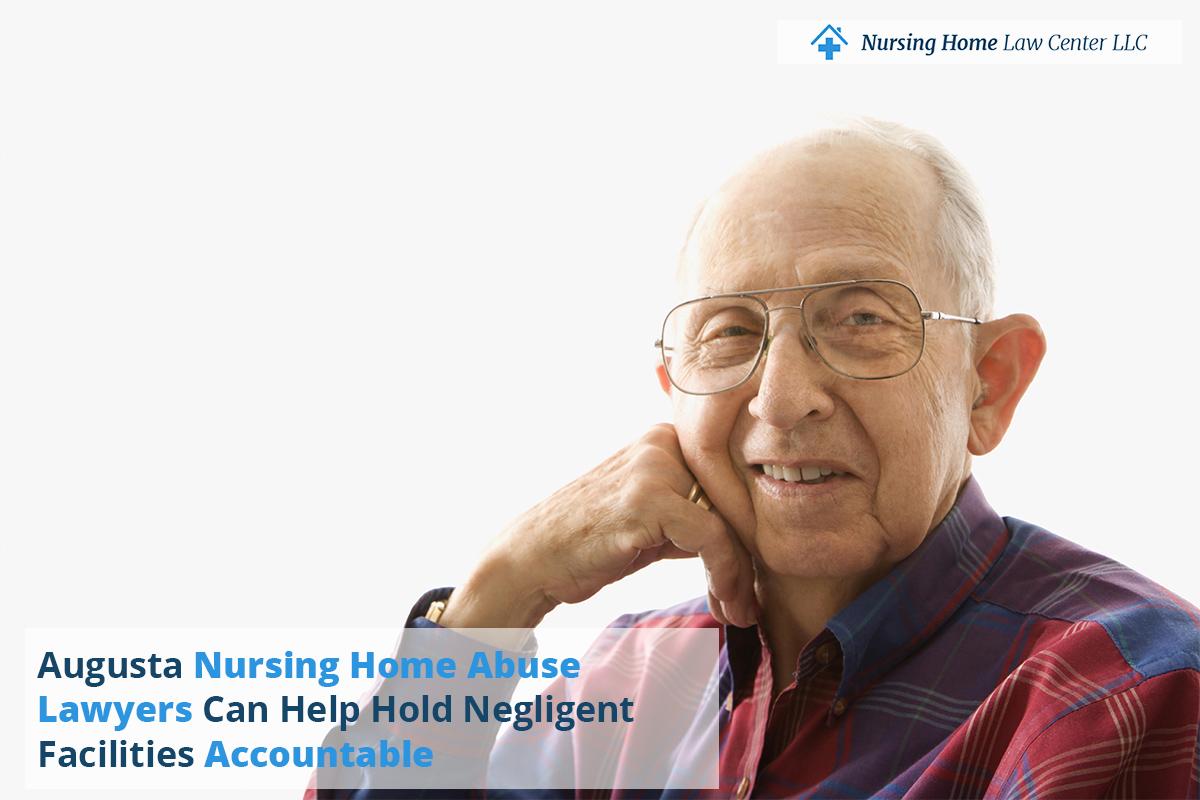
Contact an Augusta Nursing Home Abuse Attorney Today!
At Nursing Home Law Center, our experienced team of Georgia nursing home abuse lawyers is dedicated to fighting for the rights of nursing home residents and their families.
With a proven track record of handling abuse and neglect cases, we have successfully secured significant compensation for victims of physical abuse, medical negligence, financial exploitation, and wrongful death.
We offer compassionate support and expert legal representation to help you seek justice for your loved one. If you suspect nursing home abuse, don’t wait—reach out to us today for a free consultation.
Call us at (800) 926-7565 or fill out our contact form.
References: [1] Medicare
Georgia Nursing Home Abuse Lawyers
Georgia nursing home abuse lawyers are here to ensure that families across the state get the justice they deserve. Whether you live in Atlanta, Columbus, Northeast Cobb County, Savannah, or Athens, our team is dedicated to holding nursing homes accountable for their negligence. Reach out to a Georgia lawyer today to discuss your case and begin the process of seeking justice for your loved one.

